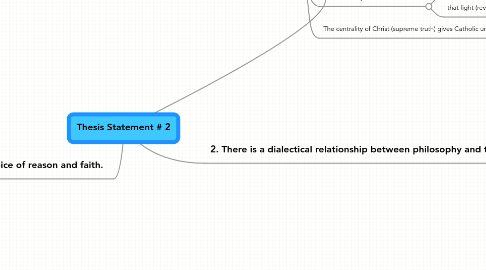
1. 1. Theology has a place in Catholic universities.
1.1. wisdom proper to the life of a believer
1.2. a direct engagement with the resources of the thinking faith
1.2.1. many Catholics and even seculars wish to pursue and have guidance in pursuing
1.3. Catholic faith liberates the university from the dark valley where the revelation of light does not shine
1.4. The university needs revelation
1.4.1. REVELATION gives us a very fragmentary glimpse of the God whom we serve
1.4.2. that light (revealed truth) does not make the the gopel true, it only permits us to live accordingly
1.5. The centrality of Christ (supreme truth) gives Catholic universities an invaluable resource for overcoming the intellectual fragmentation that besets most universities today
1.5.1. leaves intact the inherent laws of disciplines which allow them to grow to their limit and will then need the added benefit of revelation
2. 3. Thus, theology uses the voice of reason and faith.
2.1. fides quorens intellectum
2.1.1. enable the human spirit to soar to heavenly heights
2.2. Faith
2.2.1. Negative connotations
2.2.1.1. childish superstition
2.2.1.2. irrational sentiment of the heart
2.2.1.3. unfounded decision of the will.
2.2.2. What it really is
2.2.2.1. Universal human experience
2.2.2.2. both subjective and objective
2.2.2.2.1. If faith is purely subjective it becomes irrelevant to the world at large
2.2.2.2.2. Truth corresponds to reality and has validity for all times and places
2.2.2.3. Means by which we know God
2.2.3. George Lindbecks' 2 models of faith
2.2.3.1. Experiental - expressive
2.2.3.1.1. Faith as an existential response to a mysterious encounter with absolute transcendence
2.2.3.1.2. an experience devoid of all definable content
2.2.3.1.3. this model denies that faith has any doctrinal content
2.2.3.2. Cultural - Linguistic
2.2.3.2.1. criticizes experiential-expressive as being too-subjectivist and individualist
2.2.3.2.2. depicts doctrines as rules of speech that must be observed in the faith community
2.2.3.3. Both deny that the church can present objective realities
2.3. Reason
2.3.1. Negative connotations
2.3.2. What it really is
2.3.2.1. Conscious activity of the mind that seeks the truth
2.3.2.2. distinguishing gift of God to the human person
2.3.2.3. Human intellect
2.3.2.4. Natural human faculty to live a fully human life
2.3.2.5. Gives intelligibility to faith
2.3.2.6. lies at the root of human freedom and dignity
3. 2. There is a dialectical relationship between philosophy and theology, but unlike theology, Theology presupposes faith, not just reason.
3.1. usually segmented into mutually exclusive portions
3.2. philosophers usually believe that God is meaningless, while it is not unusual for many theologians to believe that faith is sufficient and reason merely pervers
3.3. Philosophy concerns itself with a search for truth
3.4. Theology also concerns itself with a search for truth; however, it presupposes a belief in God which is the foreground and background of all inquiries
3.4.1. "Theological education means participation in an inquiry into the truth and substance of all things IN THE CONTEXT OF THE PRESENT REALITY OF GOD
